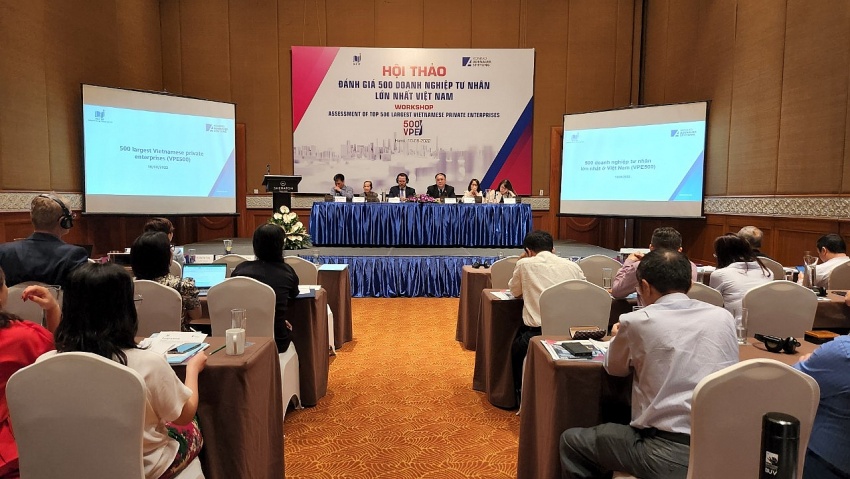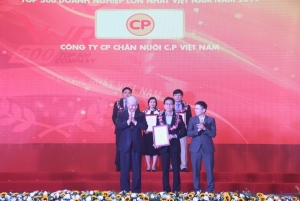Special policy required to strengthen large Vietnamese enterprises
The report on VPE500, which has just been released by the Ministry of Planning and Investment's (MPI) National Centre for Socioeconomic Information and Forecast (NCIF) on August 10, confirmed that the VPE500 has greatly contributed to the operations of the private economic sector and the national economy.
 |
| A workshop on the assessment of the VPE500 took place on August 10 in Hanoi |
Tran Toan Thang, director of the NCIF's Department of Industrial Forecast and Enterprise Development underscored the growing importance of Vietnamese private enterprises and the VPE500 in relation to the overall health of the national economy.
Despite the VPE500 representing only a small part of enterprises, due to its companies' outstanding sizes and business results, it greatly contributes to the operations of the private enterprise sector.
During 2016-2019, the VPE500 only accounted for 0.089 per cent of total enterprises, yet created 10.4 per cent of all jobs, occupied 13.0 per cent of total assets, and generated 15.8 per cent of net revenue.
VPE500 firms had an asset growth rate of approximately 15.4 per cent annually compared to just 5.6 per cent in the general private sector. Similarly, VPE500 members’ revenue increased by 11.7 per cent, while that of other businesses’ revenue climbed by 6.6 per cent.
Thang said that an overview of some current policies would show that, from orientations and guidelines to mechanisms and policies or regulations, Vietnam does not have any discrimination against, or favourable policies for, large enterprises. The government has even enacted many policies to support small and medium-sized enterprises (SME).
"However, large enterprises still have advantages in accessing resources such as land, investment opportunities, markets, finance, and opportunities to supply goods and services, thanks to incentives to attract investments, regulations on bidding conditions, and potential export customers. These advantages create a foundation for large enterprises to develop further," Thang said.
Despite the fact that private enterprises in the nation have been steadily expanding, Thang said that the VPE500 has so far not developed into a powerful force as expected, with only a few large private firms having attained world-class stature.
Even with the recent emergence of a small number of large private businesses, the value of Vietnamese brands remains lower than that seen in many other Southeast Asian nations. Meanwhile, SMEs continue to face numerous challenges during the development process, both objective and subjective.
| More specific policies are required in order to build a large and stable growing force of private enterprises that can enjoy consistent growth, withstand huge external shocks, and increase the overall efficiency of the economy as a whole. |
The report on the VPE500 pointed out that more specific policies are required in order to build a large and stable growing force of private enterprises that can enjoy consistent growth, withstand huge external shocks, and increase the overall efficiency of the economy as a whole.
"In Vietnam, the policies for enterprises over the coming years must therefore continue to be orientated towards not only creating favourable conditions for enterprises to enter the market but also surviving and growing. In particular, it can be viewed as necessary to encourage large enterprises to invest in improving productivity and gradually turn to in-depth growth," the report emphasised.
This can be seen through the issuance of economic policies to promote business partnerships, encouraging large companies, state-owned enterprises, and foreign-invested businesses to form joint ventures with domestic SMEs, as well as improving the overall capacity of enterprises to participate in global production networks, supply chains, and value chains.
Agreeing that the Vietnamese private enterprises of the VPE500 are large but not strong, economist Pham Chi Lan said that they would like to compete equally in terms of business freedom, access to resources, and intellectual property.
"Investment and business environment is focusing on cutting down costs and simplifying administrative procedures for enterprises to join the market, without paying enough attention to facilitate for them to grow quickly," said Lan. "Moreover, I see that foreign-invested enterprises can approach the resources more easily than local ones, while large firms with wide and close relationships can do more easily than the small ones."
So they also would need the policy to boost the development of some industries and encourage them to join the supply chains between large- and small-sized, large and foreign-invested enterprises, and large and state-owned enterprises.
Experts also emphasised the necessity of encouraging and creating movements so that cities and provinces can develop their own top-tier private enterprises, based on local advantages which reach out to the whole country.
 C.P. Vietnam toasted as 18th largest company on VNR500 C.P. Vietnam toasted as 18th largest company on VNR500 |
 Uplifted vista for SMEs in digitalisation and finance accessing Uplifted vista for SMEs in digitalisation and finance accessing |
 Obstructions swept up for private sector Obstructions swept up for private sector |
What the stars mean:
★ Poor ★ ★ Promising ★★★ Good ★★★★ Very good ★★★★★ Exceptional
 Tag:
Tag:
Related Contents
Latest News
More News
- Vietnam forest protection initiative launched (February 07, 2026 | 09:00)
- China buys $1.5bn of Vietnam farm produce in early 2026 (February 06, 2026 | 20:00)
- Vietnam-South Africa strategic partnership boosts business links (February 06, 2026 | 13:28)
- Mondelez Kinh Do renews the spirit of togetherness (February 06, 2026 | 09:35)
- Seafood exports rise in January (February 05, 2026 | 17:31)
- Accelerating digitalisation of air traffic services in Vietnam (February 05, 2026 | 17:30)
- Ekko raises $4.2 million to improve employee retention and financial wellbeing (February 05, 2026 | 17:28)
- Dassault Systèmes and Nvidia to build platform powering virtual twins (February 04, 2026 | 08:00)
- The PAN Group acquires $56 million in after-tax profit in 2025 (February 03, 2026 | 13:06)
- Young entrepreneurs community to accelerate admin reform (February 03, 2026 | 13:04)



























 Mobile Version
Mobile Version